
85 Fun Critical Thinking Questions for Kids & Teens

Have you ever thought about using fun questions to practice critical thinking?
Students may need a little guidance to think their way through questions that lack straightforward answers.
But it is that process that is important!
How the Right Questions Encourage Critical Thinking
Every parent knows how natural it is for children to ask questions.
It should be encouraged. After all, asking questions helps with critical thinking.
As they grow older, however, training them to answer questions can be equally beneficial.
Posing questions that encourage kids to analyze, compare, and evaluate information can help them develop their ability to think critically about tough topics in the future.
Of course, critical thinking questions for kids need to be age-appropriate—even better if you can mix a little fun into it!
That’s what I hope to help you with today. I’ve organized the questions below into three different ages groups:
- Upper elementary
- Middle school
- High school
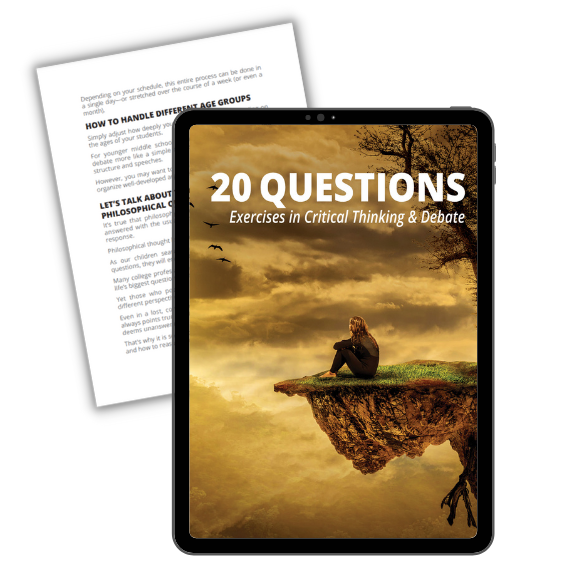
Get a Question-Based Critical Thinking Exercise—Free!
Introduce critical thinking gently & easily with thought-provoking exercises.
Upper Elementary
Students in upper elementary grades can be reluctant to put themselves out there, especially with answers that seem weird.
In some cases, such hesitancy is actually fear of differing from their peers (and a barrier to critical thinking ).
But that’s exactly why it’s important to practice answering ambiguous questions.
We want our children to stand firm for their beliefs—not cave to peer pressure.
Additionally, students may feel uneasy about answering serious questions, uncertain of tackling “big” problems.
However, with careful use of creative questions for kids, it’s possible to engage even the most reluctant children in this age group.
The idea is to simply get them interested in the conversation and questions asked.
If you have an especially reserved student, try starting with the funny critical thinking questions.
Humor is a natural icebreaker that can make critical thinking questions more lighthearted and enjoyable.
Of course, most younger kids just like to be silly, so playing upon that can keep them active and engaged.
With that said, here are some great questions to get you started:
1. Someone gives you a penguin. You can’t sell it or give it away. What do you do with it?
2. What would it be like if people could fly?
3. If animals could talk, what question would you ask?
4. If you were ice cream, what kind would you be and why?
5. Do you want to travel back in time? If yes, how far back would you go? If no, why not?
6. What could you invent that would help your family?
7. If you could stay up all night, what would you do?
8. What does the man on the moon do during the day?
9. What makes something weird or normal?
10. Can you describe the tastes “salty” and “sweet” without using those words?
11. What does it feel like to ride a rollercoaster?
12. What makes a joke funny?
13. What two items would you take if you knew you would be stranded on an island and why?
14. Do you have a favorite way of laughing?
15. What noise makes you cringe and cover your ears? Why?
16. If you could be the parent for the day, what would you do?
17. If you could jump into your favorite movie and change the outcome, which one would you pick and why?
18. If you could be invisible for a day, what would you do?
19. What makes a day “perfect”?
20. If you owned a store, what kind of products would you sell?
21. If your parents were your age, would you be friends with them?
22. Would you still like your favorite food if it tasted the same as always, but now had an awful smell?
23. What would you do if you forgot to put your shoes on before leaving home?
24. Who would you be if you were a cartoon character?
25. How many hot dogs do you think you could eat in one sitting?
26. If you could breathe under water, what would you explore?
27. At what age do you think you stop being a kid?
28. If you had springs in your legs, what would you be able to do?
29. Can you describe the color blue to someone if they’re blind?
Middle School
At this point, students start to acquire more complex skills and are able to form their own conclusions based on the information they’re given.
However, we can’t expect deep philosophical debates with 12 and 13 year olds.
That said, as parent-teachers, we can certainly begin using more challenging questions to help them examine and rationalize their thought processes.
Browse the fun critical thinking questions below for students in this age range.
You might be surprised to see how receptive middle school kids can be to such thought-provoking (yet still fun) questions .
30. What would happen if it really did rain cats and dogs?
31. What does it mean to be lucky?
32. If you woke up in the middle of a dream, where would you be?
33. Is it ever okay to lie? Why or why not?
34. If you were solely responsible for creating laws, what one law would you make?
35. What makes a person a good friend?
36. What do you think is the most important skill you can take into adulthood?
37. If you had to give up lunch or dinner, which would you choose? Why?
38. How much money would you need to be considered rich?
39. If you knew you wouldn’t get caught, would you cheat on a test?
40. If you could live anywhere in the world, where would that be?
41. What is your greatest strength? How is that an asset?
42. If you had an opportunity to visit the International Space Station, would you do it?
43. Is it better to keep the peace or speak your mind?
44. Imagine yourself as your favorite animal. How would you spend your day?
45. Would you be friends with someone who didn’t have the same values as you?
46. How much screen time do you think is too much?
47. Can you describe your favorite color without naming it?
48. If you suddenly became blind, would you see things differently?
49. Would you ever go skydiving?
50. Describe the time you were the happiest in your life. Why did this make you happy?
51. If you had a million dollars, what would you do?
52. If you had to move to a new city, would you change how you present yourself to others?
53. What do you need to do in order to be famous?
54. If you could rewrite the ending of your favorite book or movie, what changes would you make?
55. How would you tackle a huge goal?
56. How would you sell ice to an eskimo in Alaska successfully?
57. What makes you unique?
High School
Critical thinking takes on an entirely different role once students reach high school.
At this age, they have a greater sense of right and wrong (and what makes things so) as well as a better understanding of the world’s challenges.
Guiding teens to delve deeper and contemplate such things is an important part of developing their reasoning and critical thinking skills.

Whether it’s fun questions about hypothetical superpowers or tough critical thinking questions about life, older teens typically have what it takes to think their way to a logical conclusion .
Of course, use your discernment as you choose discussion topics, but here are some questions to help get you started:
58. How can you avoid [common problem] in the future?
59. Do you think it’s okay to take a life in order to save 5, 10, 20 or more people?
60. If you could go back and give your younger self advice, what would it be?
61. Is it better to give or receive a gift?
62. How important is it to be financially secure? Why?
63. If it was up to you, what one rule would you change in your family?
64. What would you do if a group of friends wanted to do something that you thought was a bad idea?
65. How do you know that something is a fact rather than an opinion?
66. What would it take to get you to change your mind?
67. What’s the most important thing in your life?
68. If money were of no concern, what job would you choose and why?
69. How do you know if you’re happy?
70. Do you think euthanasia is moral?
71. What is something you can do today that you weren’t able to do a year ago?
72. Is social media a good thing or not?
73. Is it right to keep animals in a zoo?
74. How does your attitude affect your abilities?
75. What would you do if you found out a friend was doing something dangerous?
76. If you could have any superpower, what would it be? Why?
77. What will life on Earth look like in 50 years?
78. Which is more important, ending world hunger or global warming?
79. Is it a good idea to lower the voting age to 16? Why or why not?
80. If the electrical power went out today, how would you cook if using wood wasn’t an option?
81. If you could magically transport yourself to any other place, where would that be and why?
82. When should teenagers be able to stay out all night?
83. Does the number zero actually exist?
84. What defines a generous person?
85. Does an influential person influence everyone?
Feel free to print out these fun critical thinking questions and incorporate them into your homeschool week!

will your children recognize truth?
About the author.
Jordan Mitchell

150 Fun Critical Thinking Questions For Kids, Teens, & Adults
Critical thinking questions for kids get them thinking and questioning. To go beyond rote learning.
The reason they excel later in life will not be based on the information they memorized. But instead on how well they think, make decisions, communicate, and use their creativity.
These questions are designed to help them build these essential skills.

What makes a good critical thinking question?
Open ended questions are perfect for encouraging critical thinking and problem-solving. Kids (and grown-ups) have to think about their answers. Below you will find the best age-appropriate examples to use in the classroom, at home, or during your everyday routine .
In fact, there’s no question about it. Critical thinking is important for kids. And adults too!
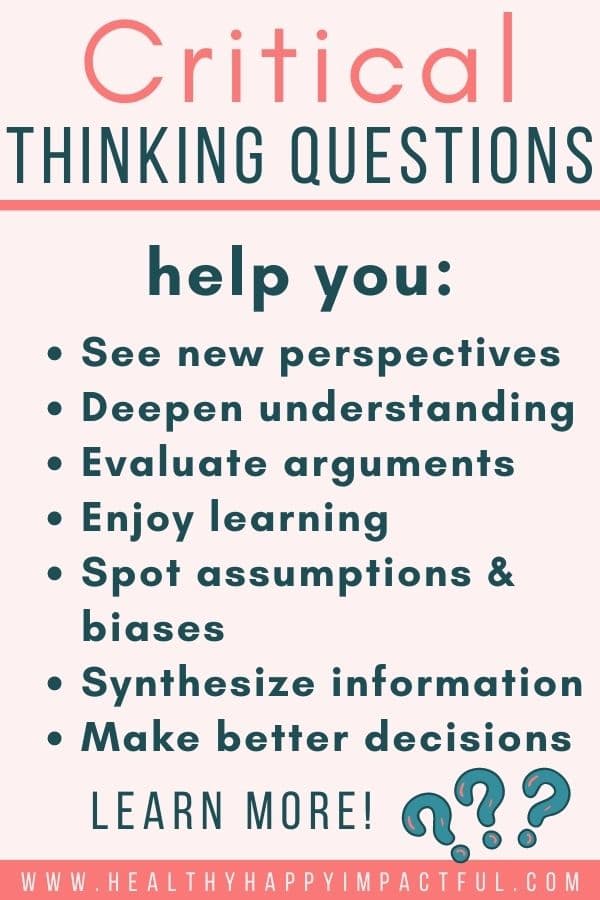
Good Questions For Kindergarten To Think Critically
Younger kids need more concrete questions. These critical thinking questions will help them use reasoning and think deeply, even when they are small.
1. How do you know if something was a good decision?
2. How are these two things similar?
3. What are the differences between _______ and _________?
4. How would you feel if __________?
This question is great for building empathy .
5. Who was the main character? Why do you say that?
6. When is ___________ a problem?

7. What is the problem?
8. Why is this a problem?
9. What did you notice about _________?
10. Do you think he/she sees this the same way you do? Why or why not?
11. Has this happened before?
12. Do you think it will happen again? Why do you think this?
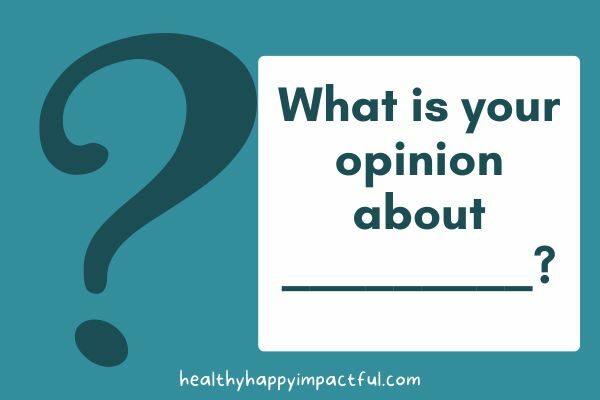
13. What is your opinion about _________? Why?
14. Is this appropriate? Why or why not?
15. What do you think would happen if __________?
16. What caused this to happen?
17. Do you think the world would be better if __________?
18. If you were in charge, what would you do differently?
19. Where can you find out more about this?
20. What does ______ mean?
21. Do you agree?
22. Can you give me an example of ________?
23. How do you know?
24. How would you solve this problem?
25. What makes something weird? What makes something normal?
Questions For Students: Elementary Through Middle School
For this age of kids, use any of the examples above and try these more abstract critical thinking questions too.

26. What do you think was the turning point?
27. Is there evidence to support your opinion (or decision)?
28. What does the evidence tell you?
29. What do you think would have been a better ending to… (book, movie, story)
30. When is the best time to start this?
31. When you think about solving a problem, where do you like to start?
32. What character/person changed the most? Why do you think this?
33. How could the author have created a thrilling twist in this story?
34. Who could help you with this? Why would they be a good fit to help?
35. Why is this important?
36. Why do you think ________ said that?
37. Why did the __________ (author, speaker) write/say this?
38. How does an idea grow? Or how does someone get from being a beginner to being an expert?
39. Do you think that what happened is what they meant to happen?
(Often, results are different than what people first think they will be.)
40. What can you use to help you decide?
41. What are the pros and cons of this?
42. Why is this happening?
43. What is the main message from this? (Or the lesson learned?)
44. What would you ask the author (speaker, etc.) if you could?
45. Do you have any questions about this?
46. Do you think it is too good to be true?
47. Can you defend these actions?
48. Compare this with this.
49. What would the world be like if ________? (kids were in charge, the sun was farther away, etc.)
50. Do you think there is a better alternative?
51. Is this person trustworthy? Why or why not?
52. At what age does someone stop being a kid? Why?
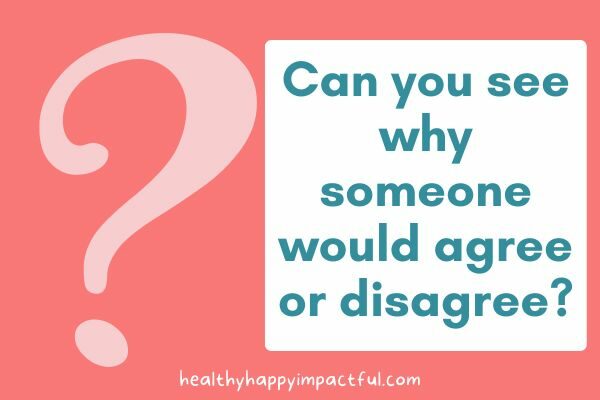
53. Can you see why someone would agree or disagree?
54. How would this ________ benefit or help others?
55. How will you know if your idea worked?
56. What is wrong with this situation?
57. What is good in this situation?
58. If someone were to argue your point, what do you think they would say?
59. Why do you think the character/person did that?
60. Is this fact or opinion? How do you know?
61. Was this change for the better? Or did it make things worse?
62. Who is most likely to _________? Why?
63. What do you think are the consequences of this decision?
64. Do you think we are asking the right question(s)? What is a different question instead?
Related Posts:
- Best Thought-Provoking Questions
- Deep Questions For Kids & Adults
- Philosophical Questions To Ponder With Kids
Critical Thinking Questions For High School & College Students
These critical thinking questions are more complex. They encourage abstract thinking, plus explore logic, ethics, and reasoning.

65. Why did you make that decision?
66. How did you get to that decision? What was your thought process?
67. What are the advantages of this?
68. What are the disadvantages of this?
69. How could we make this (project, paper, etc.) better?
70. What do you think the problem is….?
71. What do you think the best solution for this is? Why?
72. Could someone interpret this differently? How so?
73. How would you explain this to someone who doesn’t know anything about it?
74. What are a few alternative possibilities? Are any better than the others?
75. What are the short-term implications of this decision?
76. What are the long-term implications of this decision?
77. How would you achieve a big goal ?
78. (After they come up with a solution to something) Are there other possible ways to solve this problem?
79. How can you use the pros and cons to make a good decision?
80. Do you think when many people do something, it seems more “right,” even when it isn’t?
81. What are the potential risks to this decision?
82. What are the strengths of this argument?
83. What are the weaknesses of this argument?
84. Where is this lacking in evidence?
85. What can this story teach us about life?
86. Where would this solution work? Where would it not work?
87. Why do you think it is important to ask this question?
88. Why are new ideas important in our society?
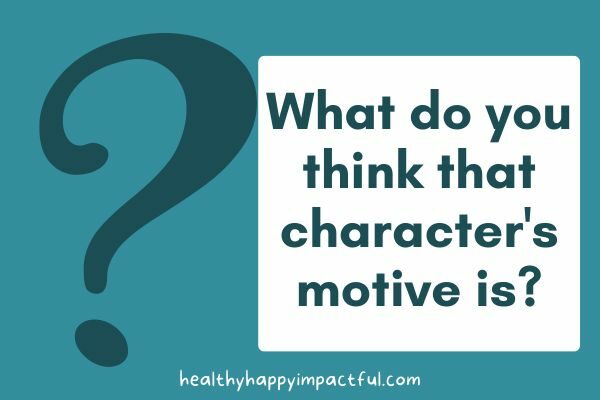
89. What do you think that character’s motive is?
90. When should you reevaluate your initial thoughts/decision?
91. Do you think this is an important issue?
92. What do you think should have happened instead?
93. What is the counterargument?
94. Why is this relevant?
95. Do you think ________ will ever happen?
96. If it does, who would it affect most? Why?
97. What assumptions are being made in this situation?
98. Is it ever ok to lie?
99. Why do you think this feels like __________?
100. How is this related to your values and beliefs?
- Best Topics To Discuss With Others
- Ice Breaker Questions To Get to Know Someone
- Best Questions To Ask Teens
Critical Thinking Questions For Adults
These are great for a conversation at home or at work interviews to see how well potential candidates think on their feet.

101. Where do you see strengths?
102. Where do you think there are areas for improvement?
103. Why did these things help you in the long run?
104. What information do you need to find out before making a good decision?
105. If you could sit down and have dinner with anyone in the world, who would it be? Why?
106. What would you say to this person?
107. Should others care about this? Why?
108. When should you ask for help?
109. Who will benefit most from this decision?
110. Who will benefit least from this decision?
111. Have we considered all the options?
112. What questions do you have?
113. Are there any biases that you think are playing out here?
114. Are you making an assumption about __________?
115. When will you see your results?
116. Where do you often find this type of problem? Why?
117. In your opinion, what caused ____________ to happen?
118. Was it avoidable?
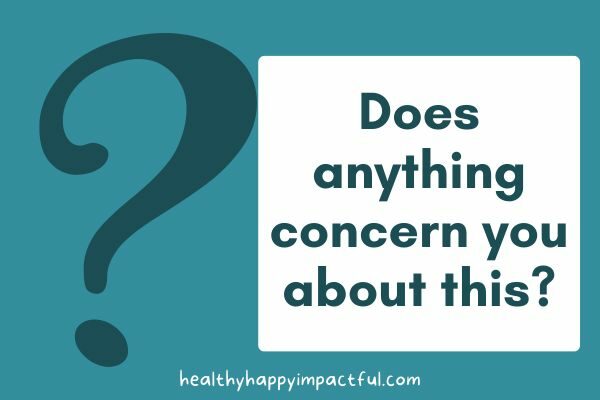
119. Does anything concern you about this?
120. When is this acceptable?
121. When is this not acceptable (or appropriate)?
122. What is one thing that would have changed everything?
123. When do you think this will benefit _________ (the company, society, etc.)?
124. When a disagreement happens at work, what do you do?
125. Is this goal achievable ?
126. How does your work experience help you fill this role?
127. Has this ever been done before? When?
128. What would need to happen for you to reconsider?
129. When will we need this?
130. What skills fit well with this position?
Related: Fun Rapid Fire Questions To Ask
Examples of Kids Critical Thinking Questions: By Word
Another way to split up your critical thinking questions is by word.

- Who is most directly affected by this decision?
- Who is the protagonist? Who is the antagonist?
- Who was the most important character?
- Who was a supporting character that was essential to the storyline?
- What is the problem you are trying to solve?
- What information is important to know about this before forming an opinion?
- What was the point of _________?
- When is it a good time to stop (or take a breather)?
- When should you know the answer?
- When will it be time for this? How do you know?
- When will this be critical?

- Where can you go to ask for help?
- Where can you find a good solution? Or information that helps you solve this problem?
- Where could this idea lead?
- Why has this issue come out into the spotlight?
- Why do you think ______ acts that way?
- Why is _______ happening, but ________ is not?
- How else could we have done that?
- How else could this be handled?
- How would you have responded in this situation?
- Fun Hobbies For Families To Do
- Best Family Challenge Ideas
More Ways To Encourage Critical Thinking In Kids
Want to go beyond questions? No problem! Here are other practical ways to build this crucial skill:

Change your questions to them.
Turn your normal yes or no questions to more open ended questions.
Example: Instead of “How was your day?” go with “What was the most interesting part of your school day today?”
Refrain from stepping in.
These days parents feel like they should be fixing their kids’ problems constantly.
Instead, hold back and force your child to problem-solve on their own. Ask questions and guide them through the problem, but let them know that they are in charge of finding their own solutions.
Play Games And Do Activities That Promote Critical Thinking
Here are a few great ones!

Two Truths & A Lie Game – The players have to decide which statements are true and which one is not. This game is great for learning to read body language too!
Good Debate Topics For Kids – Nothing builds quick critical thinking like a lively debate.
Riddles: What Am I? – These word riddles help kids think through different possibilities.
Guess The Animal Riddles for Kids – More riddles all about animals to get kids thinking.
Encourage creativity.
Provide your child with opportunities to use their imagination.
Sometimes, all this takes is getting your child off screens and outside playing with sticks!
Encourage them to build something , make up a new game, and think outside the box whenever possible.
Let them fiddle with things.
My son has a very “why” brain and loves to mess with stuff. It used to embarrass me when we were around others.
But, one day, my husband and I realized that his “working things out” isn’t bad. We just needed to teach him in what context it is appropriate. Now he fiddles with everything, and it is amazing to watch his mind work.
Let them question.
The same goes for questions. They should be challenging assumptions and questioning the world around them. Too many people take for granted the things that they hear and read. Teach your child to be different.
Promote Active Listening.
Encourage your child to ask questions to clarify understanding and develop communication skills.
Examples: “What I hear is _________.” Or, “How do you know _________?”
Try New Things.
Travel. And regularly expose your kids to new ideas and experiences. This helps them see their regular world in a new light.
Think Critically Yourself.
Finally, your child will be much more likely to think critically if they see a parent who does it. So, apply all of these strategies to yourself as well.
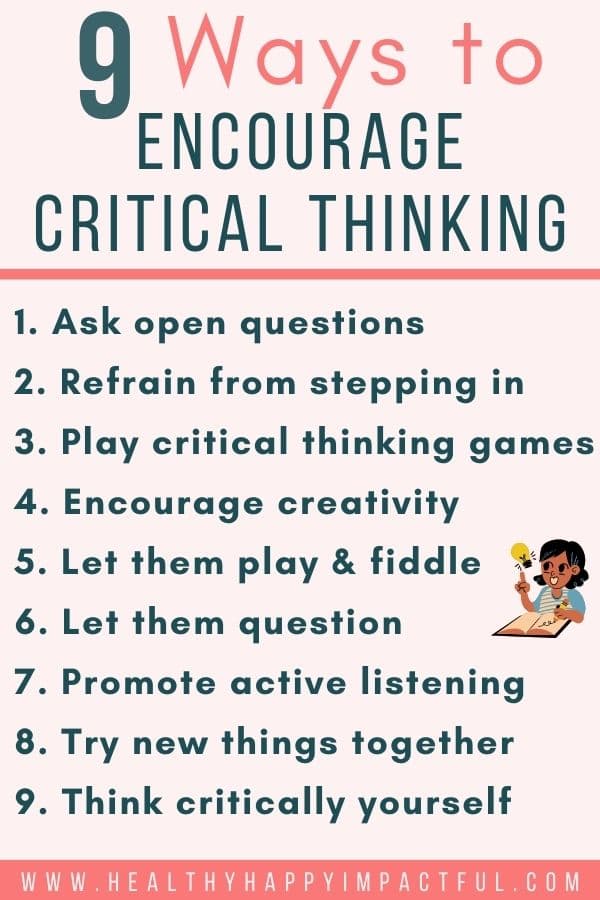
To Consider With Critical Thinking Questions For Kids
Teaching children to form their own opinions is how we build a generation of people that will analyze, evaluate, and make decisions for the betterment of the world.
It’s not just important. It’s critical to our future as a society.
More family-friendly posts you’ll love…
- Telephone Game Phrases & Statement Ideas
- Ice Breaker Kids & Teen Games
- Best Books List For 4 Year Olds
Creative Kids Critical Thinking Questions For Students
Jennifer is the founder and chief editor of Healthy Happy Impactful®. She believes that living, loving, and connecting deeply are the foundation for a good life. She holds a degree in education and is a mom to 3 kids.

100 Critical Thinking Questions For Kids [PDF Included]
Last Updated on April 5, 2024 by Editorial Team
Critical thinking is an essential skill that helps a person derive information on a particular subject, analyze it by comparing it with relevant things and arrive at a conclusion. While doing so, the person utilizes their thinking ability to develop a 360-degree overview of a subject to find a solution.
We may not realize it, but we are constantly using our critical thinking ability in our daily lives . For example, any important decision in our life requires us to think critically before we arrive at it. Therefore, practicing and refining these skills is necessary.
Kids do get opportunities to think critically as they go on with life, however, parents and teachers can encourage kids to use these skills by asking simple age-appropriate questions. In this write-up, we have prepared a list of questions that can boost a child’s critical thinking skills . Let’s look at them now.
Critical thinking questions for preschoolers/ kindergarteners

1. How would you feel if you cannot go out to play?
2. if you could visit a cartoon character, which one would it be, 3. who do you want to pick you up from school – mom or dad, and why, 4. if you get a day off from school, who would you like to visit and what would you do there, 5. if you had to exchange a toy with your friend, which one would it be and why, 6. what do you think your mom does when you are at school, 7. if your pet could talk for a day, what would you two talk about, 8. if god wants to grant you a superpower, which one should it be and why, 9. where is daniel tiger’s neighbourhood and how can you find out how to get there, 10. what will happen to slime if you leave it out overnight on a table, 11. what do your toys do when you go to bed at night, 12. if you could change your mommy and daddy’s name, what names would you choose for them, 13. why is it important to wash your hands when they get dirty, 14. if you had a shop, what would you sell, 15. where would you go if you had wings to fly, 16. what would you enjoy more and why – going to the beach or visiting the zoo, 17. if your parents allow you to buy one thing for yourself, what would it be and why, 18. would you rather eat a cookie or a slice of pizza, 19. how can you be nice to your friends, 20. what’s more fun – jumping in a muddy puddle or jumping in a foam pit.

Critical thinking questions for elementary students
1. what would happen to the world if there was no sun, 2. if the wimpy kid had no siblings, how different would his life be, 3. how can a person become an expert at something, 4. how are you different from other kids in the class , 5. what would happen if there were no adults in the world, 6. if you could turn a historical figure alive, who would it be and why, 7. if you get to be a parent for a day, what changes would you bring to house rules.

8. How can you help a friend with studies?
9. how can you handle bullies in school, 10. what is the one thing you enjoy doing when you return home from school and why, 11. how would your life be if you lived in a jungle, 12. if your parents allow you to stay awake all night, how would you spend your time, 13. if you had to dress up like a famous person for one day at school, who would you choose to be and why, 14. what came first – the chicken or the egg, 15. if you discovered a new color, what would you name it, 16. how will your life change if your parents get you a pet, 17. if you were to lose one of your senses, which one are you willing to give up, 18. which three emotions do you experience the most, 19. can there be life on other planets, 20. is there anything that bothers you and how can you try to fix it.

Critical thinking questions for middle schoolers
1. if you were to invent one thing, what would it be and why, 2. if you were lost, how would you find your way back home, 3. if you must describe yourself in five words, which ones would they be, 4. is there a family tradition you enjoy the most which one is it and why do you love it, 5. how is lying bad for you, 6. why do adults not follow the rules they make for their kids, 7. what is one thing about the school you would never want to change, 8. how would life on earth change if there were no days and only nights.

9. What do you want to be in the future?
10. what do you prefer and why – going outdoors or staying indoors, 11. why and how can we protect our environment, 12. can you estimate how many mobile phones there are in the world, 13. why is it important to learn more than one language, 14. if you were stranded on an island, what would you do to survive, 15. should animals be left alone in the jungle or should they be kept in zoos, 16. if you had to donate your pocket money, where would you donate it and why, 17. what things are hard for kids but easy for grown-ups, 18. how would you change a story’s ending, 19. how can you avoid a particular problem, 20. is this sentence an opinion or is it a fact.

Critical thinking questions for high schoolers
1. how will you help a blind person with directions.

2. Is there a career option you would never choose and why?
3. which traits make you unique in the class, 4. if you get a chance to go back in time, what is the one thing you would change and why, 5. what can high schoolers do to improve themselves, 6. as a teenager, what do you find the most challenging, 7. what could we do to prevent this from happening again, 8. when did you no longer consider yourself a child, 9. if you get a chance to go on an international vacation, where would you go and why, 10. how can your generation contribute to making this world a better place to live in, 11. what was your biggest achievement in the past month, 12. when do you call a day ‘perfect’, 13. if there was a pizza-eating contest, how many slices would you be able to eat, 14. what are the pros and cons of children having their own phones, 15. which issue is more important to address – climate change or poverty and hunger, 16. what global changes do you wish to see 30 years from now, 17. what would you do if you won a cash prize of one million dollars, 18. if there’s a medical emergency, how would you help, 19. is too much money a good or a bad thing, 20. should public schools have uniforms for students.

Few more questions to encourage critical thinking
1. if you were on the opposite side, how would your perspective be different, 2. how can you find a solution to this problem, 3. is there a way to prevent this issue from occurring in the future, 4. how can you explain this with an example, 5. can we arrive at a solution using a different route, 6. how can you find out if something is true, 7. what life lesson can you derive from this situation , 8. how can you apply the lessons you learned by reading a book in your real life, 9. why do you think this is important , 10. what are your strengths and weaknesses, 11. how can society benefit from ——, 12. how can we improve this, 13. will this cause a problem, 14. what else can be done to make it better, 15. what assumptions are you making while dealing with this problem, 16. which approach is better, 17. what are your views – agree or disagree, 18. how does journaling help, 19. is it relevant to what we are talking about, 20. how could this negatively impact us.

In conclusion
People have different critical thinking abilities and those who excel at this skill are highly regarded in the workplace too! To help our children stay in tune with the rapidly changing world, we can ask them to answer the above questions so they get into the habit of analyzing things critically before arriving at conclusions.
Just take out five minutes a day to discuss any matter and blend these questions into your discussion. It can be done in the classroom, at the dining table, or whenever you get a chance to sneak in a bit of learning and stimulate critical thinking in children.

I am Priyanka Sonkushre, a writer and blogger. I am the person behind “ One Loving Mama ,” a mom blog. Equipped with a Bachelor’s degree along with an MBA, my healthcare background helps me deeply understand learning difficulties. I know how challenging it can be for parents to find the right resources to help their children excel in life. So, here I am to blend my healthcare expertise with my parenting experience to create valuable and helpful resources for parents and teachers supporting children with learning differences. If you wish, you can follow me on Facebook and LinkedIn .
Leave a Comment Cancel reply
You must be logged in to post a comment.
Critical Thinking Questions for Kids
Michele is a writer who has been published both locally and internationally.
Learn about our Editorial Policy .
Critical thinking questions for kids engage their imagination and analysis skills. Kids' critical thinking skills develop at different ages, so keep in mind your child's developmental age when choosing questions that challenge their logic and reasoning.
What Is Critical Thinking?
Critical thinking is essentially the ability to find information and use it to make sense of something. When kids think critically they can analyze data, compare and contrast things, and make decisions based on the information they have. It's more than just learning to solve problems, it's understanding how to solve problems in different ways.
- 175 Would You Rather Questions for Kids to Get Them Thinking
Critical Thinking Questions for Young Children
Children ages 2 to 7 are not mentally equipped for complete critical thinking. They learn through imaginative play and language, but can't truly understand the perspectives or motivations of others. Critical thinking questions for preschoolers and kindergarteners should focus on comparisons and reasoning.
Fun Critical Thinking Questions
- Do you think your pet could join the Paw Patrol?
- When Baby Shark grows up, will he still be called Baby Shark?
- What would you do for fun if there were not TVs, tablets, video games, or smartphones?
- What could you do to find out how to get to Sesame Street?
- What do you think your toys do at night?
- Why do you think cartoon characters wear the same clothes every day?
Serious Critical Thinking Questions
- Would you rather be a preschooler or a kindergartener? Why?
- What would happen if you left your play dough out on the table all night long?
- What makes you different from the kids in your class?
- How would your life be different if you had another brother or sister?
- If you could choose your own name, what name would you choose?
Critical Thinking Questions for Ages 7 to 10
Older elementary students ages 7 to 10 start to develop true critical thinking skills. They are able to see someone else's point of view, make logical inferences, and separate fact from fiction. At this age you can start to use more open-ended questions about things relevant to a child's life or classroom lessons to engage critical thinking skills.
- What makes a Pokémon stay inside a Poké Ball?
- What could Nerf guns shoot besides foam that wouldn't hurt anyone or make a mess?
- Do you think Barbie could do all the jobs she does if she were a human?
- What do you think would happen if your best friend was in charge of ROBLOX from now on?
- How do you think SpongeBob SquarePants ended up in the ocean with a bunch of animals and creatures?
- What would happen if it never rained?
- What are all the ways you could get money to buy a new toy if you're too young to get a job?
- Do you agree or disagree that kids should have gym every day at school?
- What do you think your teacher does when he/she isn't at school?
- How could you become a Lego Master Builder?
Critical Thinking Questions for Middle School
Tweens and teens have developed strong logic skills and are advancing to more abstract reasoning. They can see information from multiple perspectives and answer complex critical thinking questions.
- Where do you think the name "Fortnite" came from?
- Could you play a sport with a ball from a different sport? For example, could you play basketball with a volleyball?
- Video games evolved from only using handheld controllers to VR headsets. What do you think will be the next great gaming invention?
- How could you classify everyone in your class into exactly five categories?
- Why are there so many Disney Princesses, but no characters called Disney Princes?
- How would your life change if your were sucked into your favorite book?
- Do you think middle schoolers should still have recess ?
- Is it better for kids to play video games or watch TV?
- What are some ways you could learn a new language without taking a class?
- Who do you think has an easier life, middle schoolers or their parents?
- If your parents disappeared, how would you survive?
- If art imitates life, which famous painting best imitates your life?
Ideas for Using Critical Thinking Questions With Kids
Whether you're using the questions at home or in the classroom, the key is to give kids ample time to respond. Critical thinking is not about speed, it's about being thorough.
- Play brain games that incorporate logic and reasoning skills.
- Have kids use the scientific method steps to solve social problems or other problems that aren't science experiments.
- Write a question of the day on a dry erase board and ask kids to write their answer in a journal during down times.
- Use kids' puzzles in creative ways like asking small groups to complete them without talking.
- Make a list of items and ask kids to sort them into logical categories.
- Print out children's brain teasers for kids to solve after completing a test or homework assignment while waiting for everyone to finish.
- When reading a story or watching a video, stop frequently to ask questions that require deeper thought.
- After teaching a skill ask students to suggest other ways of teaching it.
- Discuss current events that are kid-friendly and host debates that cover both sides of timely issues.
Grow Your Child's Brain
Every child's brain is filled with pathways where information can travel. Cognitive activities for kids like asking critical thinking questions help build and solidify these pathways to increase your child's thinking abilities.
Want a daily email of lesson plans that span all subjects and age groups?
Subjects all subjects all subjects the arts all the arts visual arts performing arts value of the arts back business & economics all business & economics global economics macroeconomics microeconomics personal finance business back design, engineering & technology all design, engineering & technology design engineering technology back health all health growth & development medical conditions consumer health public health nutrition physical fitness emotional health sex education back literature & language all literature & language literature linguistics writing/composition speaking back mathematics all mathematics algebra data analysis & probability geometry measurement numbers & operations back philosophy & religion all philosophy & religion philosophy religion back psychology all psychology history, approaches and methods biological bases of behavior consciousness, sensation and perception cognition and learning motivation and emotion developmental psychology personality psychological disorders and treatment social psychology back science & technology all science & technology earth and space science life sciences physical science environmental science nature of science back social studies all social studies anthropology area studies civics geography history media and journalism sociology back teaching & education all teaching & education education leadership education policy structure and function of schools teaching strategies back thinking & learning all thinking & learning attention and engagement memory critical thinking problem solving creativity collaboration information literacy organization and time management back, filter by none.
- Elementary/Primary
- Middle School/Lower Secondary
- High School/Upper Secondary
- College/University
- TED-Ed Animations
- TED Talk Lessons
- TED-Ed Best of Web
- Under 3 minutes
- Under 6 minutes
- Under 9 minutes
- Under 12 minutes
- Under 18 minutes
- Over 18 minutes
- Algerian Arabic
- Azerbaijani
- Cantonese (Hong Kong)
- Chinese (Hong Kong)
- Chinese (Singapore)
- Chinese (Taiwan)
- Chinese Simplified
- Chinese Traditional
- Chinese Traditional (Taiwan)
- Dutch (Belgium)
- Dutch (Netherlands)
- French (Canada)
- French (France)
- French (Switzerland)
- Kurdish (Central)
- Luxembourgish
- Persian (Afghanistan)
- Persian (Iran)
- Portuguese (Brazil)
- Portuguese (Portugal)
- Spanish (Argentina)
- Spanish (Latin America)
- Spanish (Mexico)
- Spanish (Spain)
- Spanish (United States)
- Western Frisian
sort by none
- Longest video
- Shortest video
- Most video views
- Least video views
- Most questions answered
- Least questions answered

How could so many people support Hitler?
Lesson duration 05:10
328,604 Views

Can you solve the magical maze riddle?
Lesson duration 04:51
356,601 Views

How to make smart decisions more easily
Lesson duration 05:16
1,140,894 Views

Can you solve a mystery before Sherlock Holmes?
Lesson duration 05:17
477,617 Views

Can you solve the secret assassin society riddle?
Lesson duration 05:01
712,850 Views

How to overcome your mistakes
Lesson duration 04:52
915,274 Views

Can you solve the cursed dice riddle?
Lesson duration 04:31
712,364 Views

Why some people don't have an inner monologue
Lesson duration 12:03
2,788,449 Views

Science vs. Pseudoscience
Lesson duration 05:48
351,882 Views

Can you solve the time traveling car riddle?
Lesson duration 05:18
636,992 Views

This one weird trick will get you infinite gold
Lesson duration 05:08
1,032,439 Views

How to quit your job — without ruining your career - Gala Jackson
Lesson duration 06:13
106,876 Views

What if you experienced every human life in history?
Lesson duration 05:21
2,833,179 Views

How to design climate-resilient buildings - Alyssa-Amor Gibbons
Lesson duration 14:12
43,441 Views

The case for free, universal basic services - Aaron Bastani
Lesson duration 19:09
80,389 Views

Can you steal the most powerful wand in the wizarding world?
Lesson duration 05:20
768,776 Views

History vs. Thomas Jefferson
464,745 Views

The best way to apologize (according to science)
Lesson duration 05:06
1,461,739 Views

How do we determine the value of a life?
Lesson duration 06:06
736,728 Views

What’s the smartest age?
Lesson duration 04:53
1,576,914 Views

The Boltzmann brain paradox
Lesson duration 05:40
1,143,720 Views

The 4 greatest threats to the survival of humanity
Lesson duration 05:24
486,988 Views

Can you outsmart the college admissions fallacy?
Lesson duration 06:17
817,717 Views

Can you solve the fortress riddle?
Lesson duration 05:23
1,229,045 Views
.png)

101 Questions for Kids to Get Them Thinking and Talking [all open-ended]

How can you have more meaningful conversations with your kids? How can you use these conversations to also build up their skills to prepare them for their future? What questions are quick and fun to ask but also get them thinking critically, logically and laterally?
We have done the hard work so you don't have to! Here are 101 questions for kids that will get them "thinking and talking" - helping you get to know your child with more meaningful conversations, and at the same time building the skills they need to thrive in tomorrow's world (e.g. critical thinking, communication, creativity etc).
It's perfect for 6-12 year olds and can be done whenever you have a few minutes. Parents we work with tend to have these chats in the car, or after school or at the dinner table.
See the KidCoachApp that thousands of other parents have been using to have all this and more in the palm of your hand, but in the meantime enjoy the list below.
.png)
Critical thinking questions
1. How many iPads do you think there are in the world?
2. How many grains of sand do you think there are on a typical beach?
3. What would you do with a million dollars?
4. If you could go back and time and change one thing, what would it be and why?
5. If you could have any superpower, what would it be and why?
6. Is there life on other planets?
7. What would you name a new colour?
8. What are 10 different things you can do a cup?
9. How would you improve a sofa to make it better?
10. When Baby Shark grows up, will he still be called Baby Shark?
11. What would happen if it never rained?
12. How can you make £100 or $100 by next week if you wanted to?
If you are particularly interested in critical thinking then this ultimate guide to developing critical thinking skills in your kids is a must-read.
Debating questions for kids
13. Should children set their own bedtimes?
14. Do you need teachers at school or can you just learn from computers?
15. Is it right to eat animals?
16. Should everyone donate money to charity?
17. Should children have to wear school uniforms?
18. Should children choose what to learn at school themselves?
19. Does Santa Claus only bring presents for good children?
20. Should zoos be banned since they are unfair to animals?
21. Should children be paid if they get good grades?
22. Is social media a good or a bad thing?
23. Should every child have their own mobile phone?
Fun communication challenges
24. How would you describe a car to an alien?
25. How would you describe a tree without saying green, plant or leaves?
26. What is a rectangle?
27. How would you describe an elephant without saying animal, trunk or grey?
28. What is a circle?
29. Can you name 10 different emotions?
30. What is the number five?
31. Can you say the alphabet backwards?
32. Can you talk for one minute about anything without saying “umm” or “err”?
33. Can you say “Hello” in three different accents?
For more fun talking game ideas, check out this list of 22 car games to keep kids entertained using only your voices!
Alternatives to “How was your day?”
34. What was the best thing that happened to you today?
35. What will you do tomorrow that you did not do today?
36. Tell me about something new that you learned today?
37. What made you laugh today?
38. Who did you play with today?
39. What did you eat for lunch?
40. What kind of a person were you today?
41. What made your teacher smile today?
42. What made you really proud today?
43. What questions did you ask the teacher today?
44. What do you think your teacher will be doing tonight?
Would you rather questions?
45. Would you rather find true love or win one million dollars?
46. Would you rather end poverty or end racism?
47. Would you rather be gossiped about or ignored?
48. Would you rather be an ant or a fly?
49. Would you rather be able to fly or have super strength?
50. Would you rather be 1 foot taller or 1 foot shorter?
51. Would you rather be more like Mum or more like Dad?
52. Would you rather be the sand castle or the wave?
53. Would you rather live to 100 years old sad or live to 50 years old but happy?
54. Would you rather live without TV or live without internet?
We have lots more of these by the way in this 101 list of the BEST "would you rather...?" questions for kids.
Try these with Harry Potter fans!
55. Which Hogwarts house would you be sorted into and why? (critical thinking)
56. If you owned the Philosopher's stone and could live forever, what would you do? (creativity)
57. What make Harry Potter a good leader? (leadership)
58. Is Professor Snape on the good side or the bad side? (critical thinking)
59. Why do wizards hide themselves away from muggles? (philosophy)
60. How would you explain the game of quidditch to a muggle? (communication)
61. Why are most wizards scared to say "Lord Voldemort" out aloud? (empathy)
62. How do dementors make you feel? (mindfulness)
63. If you were an animagus and could turn into any animal, which would you choose and why? (creativity)
64. Which magical object would you choose to have and why - marauders map, time turner or invisibility cloak? (critical thinking)
65 . What makes Dumbledore such a good headmaster? (leadership)
Get to know you interview questions
66. What are your three greatest strengths?
67. What is your favourite subject?
68. What makes you different?
69. What are your three greatest weaknesses?
70. Who do you want to be like when you grow up?
71. What is happening in the book you are reading right now?
72. What will be different about the world when you are an adult?
73. What is going on in the news at the moment?
74. Who are your best friends and why do you like each other?
75. What is the funniest thing you have ever done?
76. What motivates you?
To build resilience
77. What is a growth mindset?
78. What do you feel grateful for today?
79. What is something you can do today that you couldn’t last year?
80. What does a confident person look and sound like?
81. What do you worry about the most?
82. What are you better at than most other people?
83. What do you love to learn?
84. What make you happy?
85. How important is winning?
86. What is your best quality?
87. What do you find really easy to do?
88. What can you teach others?
Perfect for family dinners
89. What is your favourite dessert?
90. If you could just eat one food forever what would it be?
91. Where shall we go on holiday next?
92. What is one thing you admire about the person on your left?
93. What animal are you most like and why?
94. If you could swap places with anybody else in the family for one day, who would you pick and why?
95. Tell us something about yourself that we probably don’t know?
96. If you could have one wish what would it be?
97. What is the hardest thing about being a child?
98. What three words best describe you?
99. What three things do we want to do as a family next month?
100. If you could choose a new name, what would it be?
101. What will we all be doing in 20 years time?
A final suggestion
If you liked this then why not check out the KidCoachApp (30 second demo video above) which has everything from this article and much more in it, all regularly updated!
It puts these great questions in the palm of your hand and the next time you are in need of some conversation inspiration all you have to do is whip out the app! There are hundreds of critical thinking questions for kids that need logical and lateral thinking to answer.🤔
We are backed by lots of education and parenting experts (see our Advisory Board here ) and parents have absolutely loved using the KidCoachApp (see the reviews here ).
It's a 2 week free trial, with no payment details needed, so you have nothing to lose. 👍
👇 Download the KidCoachApp now from your usual app store.
Start your free 2 week trial seconds. No payment details needed.

Kavin Wadhar
Kavin Wadhar is a parent of 2 kids and founder of www.KidCoach.app: guided conversations for parents to get their kids talking, thinking and feeling. Kavin left his corporate role in education publishing to pursue his passion to help parents develop in their kids the skills they need to thrive in tomorrow’s world. Working with a team of parents and education experts, Kavin has built an App for parents with hundreds of questions like those in this article, and with additional guidance / prompts to take conversations deeper. Check it out!
Want more like this?
Most popular articles:, connect through conversation, download the kidcoachapp free for hundreds of quick, fun and thought-provoking questions your kids will love.


Home » Tips for Teachers » Critical Thinking Strategies for Elementary Students: 7 Exercises and 5 Activities to Help
Critical Thinking Strategies for Elementary Students: 7 Exercises and 5 Activities to Help
Teaching students to think critically from an early age is essential. In order to excel in school and beyond, students need to learn and practice critical thinking skills.Being a critical thinker will aid students in making good decisions, both related to learning and to their personal lives. It will also be extremely helpful in helping them solve problems and overcome the various challenges that they are faced with.
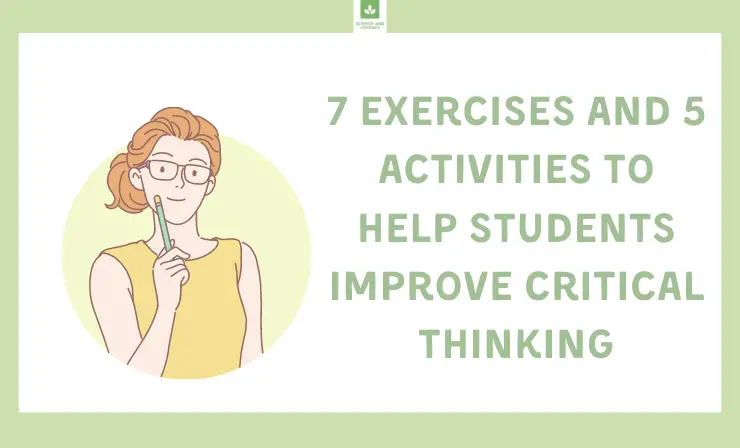
As teachers, we always hear a lot about how important it is to help our students learn to think critically. What I’ve noticed, however, is that teachers don’t get enough support with the “how” of actually teaching their students to become critical thinkers.
I would like to help you learn more about what you can do to help impart these essential skills on your students. Continue reading, and I’ll share:
- Critical thinking games and activities you can play with your students →
- Why critical thinking is important →
- Critical thinking strategies for elementary student →
- Critical thinking exercises to use with elementary school students →
5 Critical Thinking Games and Activities
The games and activities shared below are great for helping your students develop and fine tune their critical thinking skills.
1. The Barometer
This activity can help students see that there are more than simply two opinions for any given topic. For this activity, come up with a list of semi-controversial issues appropriate for the grade you teach. Some examples include giving students no homework, setting limits on screen time, removing specials or recess, etc.
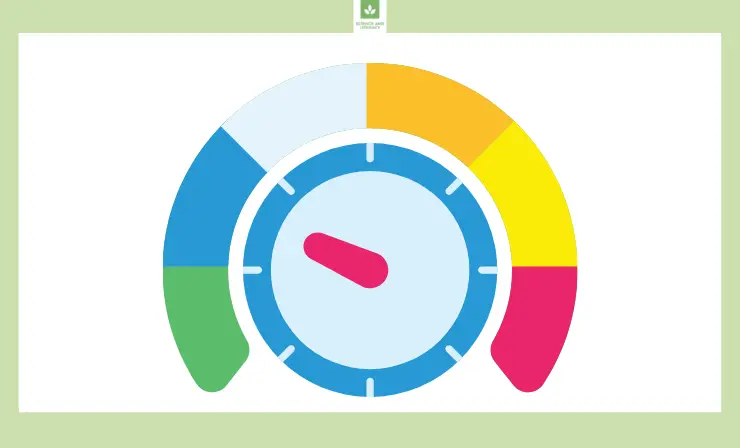
Then, label each side of the classroom with one of the two most extreme opinions related to the topic. Tell students that they need to place themselves on the continuum to designate where their opinion falls.In order for students to decide exactly where they should be standing, they’ll need to have discussions with other students to compare their opinions. This process will help expose them to the logic and reasoning that others are using to form their own opinions, even if they are different from those held by the student.
This could be an interesting lesson to record and reflect back on. You can discuss the different conversations students had with one another and how those conversations helped them decide where to stand.
2. Debating the Accuracy of a Globe vs a Map
This activity is ideal for older elementary school students studying geography. For the lesson, you can have students compare the relative sizes of Australia and Greenland on a map vs a globe. Then, discuss how one representation makes Greenland appear to be larger, and how the other makes Australia appear larger.
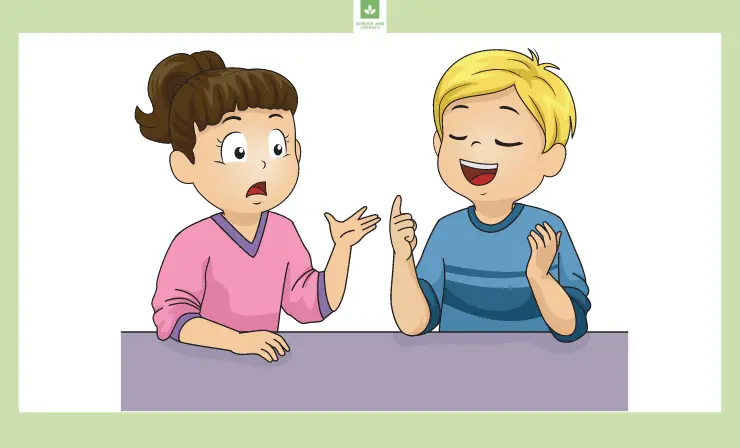
Encourage students to think about why this difference in representation may occur. Then, have a classroom debate about which geography tool is more accurate and why.You may want to project a world map using your document camera and have a few different globes available for students to examine.
This video shows a teacher leading his students through this critical thinking exercise. Watch it to see the lesson in action and see one teacher’s approach to using it with his students.
Do you think your students could benefit from this lesson? How do you see using it in your classroom?
3. Media Bias Scavenger Hunt
This activity can be especially beneficial in today’s world. Students will need to identify media bias in news stories and separate fact from fictionFor this activity, provide students with a few different news stories and hoaxes. Students will need to conduct research and determine which of the stories are real news and which are simply made-up hoaxes.
Encourage students to find at least two legitimate sources to back up the stories they classify as real news. After students have completed their work, you can have them share the sources they found to back up each true story on your interactive whiteboard.
This video shares more about this critical thinking activity. You can also learn more about a few additional activities you may want to try with your students.
4. Brain Teasers
Brain teasers are an excellent way to help students improve their critical thinking skills. In order to solve a brain teaser, students need to combine information from multiple sources, consider their background knowledge, and think outside of the box.
You can use this video with a brain teaser about a rooster laying an egg on the roof of a barn with your students. It sets up the scenario and even helps explain the correct solution and why such a ‘simple’ solution is overlooked by many.
Were you able to come up with the correct solution to the brain teaser? Or, did the misdirection with all the unnecessary key details take your focus off the fact that roosters can’t lay eggs?
5. Take a Side
For this activity, students will need to choose one of two sides representing opposing views to a question. For example, you can ask students to agree or disagree to a statement about a text they have read.Students should stand on one side of the room to show their opinion. Then, you can call on different students to share their reasoning for selecting whether they agreed or disagreed with the question.

After each student shares their rationale, provide an opportunity for students to switch to the other side of the room if they have changed their opinion.
Why Critical Thinking is Important
Critical thinking is important well beyond the school years. Students need to learn how to think critically and evaluate different options in order to make the right decision.Of course, these decisions could be related to academics, as with choosing the most logical answer to a question. However, critical thinking skills will also serve your students well as they grow older and need to decide about a future career, how to treat a friend, or even whether they should drink and drive.
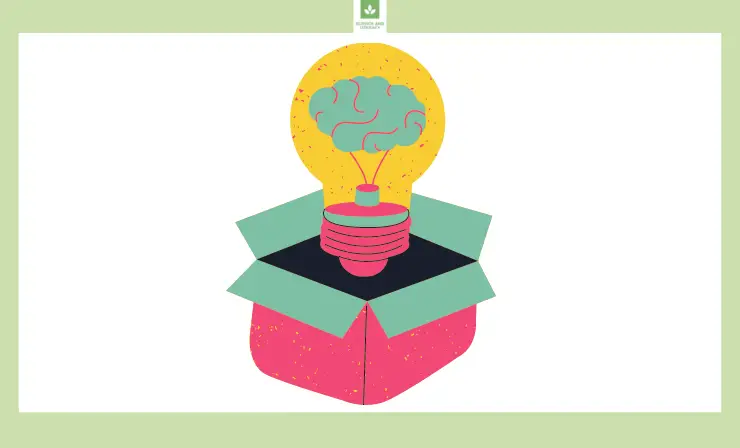
Everyone has inherent biases. Teaching critical thinking to your students will allow them to identify these biases and try to focus on the facts of a situation. It also helps remove some of the emotions from a decision and allows students to clearly see the different points of views of others.Of course, part of your job as a teacher is to prepare your students for the real world and life after school. This includes helping them gain the skills they’ll need to be a successful candidate.
Monarch Elementary teachers have so many great ideas for inquiry instructional strategies and how that increases student engagement, rigor, and critical thinking! @voverman2 @markloach @MeganHoefe pic.twitter.com/z3AItMHnGQ — Katie Delloso (@Katie_Delloso) March 24, 2021

The Tech Edvocate
- Advertisement
- Home Page Five (No Sidebar)
- Home Page Four
- Home Page Three
- Home Page Two
- Icons [No Sidebar]
- Left Sidbear Page
- Lynch Educational Consulting
- My Speaking Page
- Newsletter Sign Up Confirmation
- Newsletter Unsubscription
- Page Example
- Privacy Policy
- Protected Content
- Request a Product Review
- Shortcodes Examples
- Terms and Conditions
- The Edvocate
- The Tech Edvocate Product Guide
- Write For Us
- Dr. Lynch’s Personal Website
- The Edvocate Podcast
- Assistive Technology
- Child Development Tech
- Early Childhood & K-12 EdTech
- EdTech Futures
- EdTech News
- EdTech Policy & Reform
- EdTech Startups & Businesses
- Higher Education EdTech
- Online Learning & eLearning
- Parent & Family Tech
- Personalized Learning
- Product Reviews
- Tech Edvocate Awards
- School Ratings
Keeping Yourself Safe in College: Everything You Need to Know
Myths about online high schools: everything you need to know, reasons you should study geography: everything you need to know, the vtoman jump 1800 portable power station: the best of the best, key roles of a school superintendent: everything you need to know, is earning a degree online worthwhile and beneficial, why learners cheat: everything you need to know, top issues in education: everything you need to know, duties of a school principal: everything you need to know, private vs. public education: everything you need to know, 16 critical thinking questions for students.
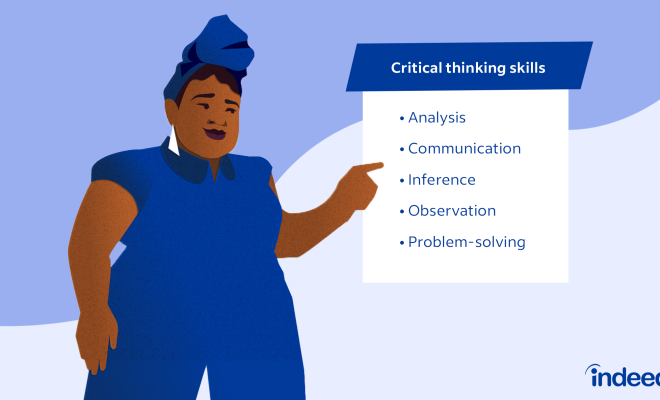
Introduction:
Critical thinking is an essential skill for students to develop, as it enables them to analyze information, evaluate arguments, and make informed decisions. To enhance critical thinking abilities, students can engage with thought-provoking questions that challenge assumptions and encourage deeper reflection. In this article, we present sixteen critical thinking questions that will stimulate their cognitive abilities and foster intellectual growth.
1. What evidence supports this argument?
Assessing the evidence behind an argument encourages students to analyze whether it is sufficient, credible, and logically sound. This question teaches them to question the basis of statements and seek supporting evidence.
2. How can you apply this concept in real-life situations?
Connecting abstract concepts to practical scenarios helps students understand the relevance and applicability of what they learn. This question encourages them to think beyond classroom discussions and consider real-world implications.
3. What are the underlying assumptions in this statement?
Identifying assumptions allows students to recognize hidden biases or prejudices in arguments. By questioning underlying assumptions, they can develop a more nuanced understanding of complex issues.
4. Can you think of alternative explanations?
Encouraging students to consider alternative explanations fosters their ability to think critically and challenge initial conclusions. This question helps them explore different perspectives and understand that there can be multiple plausible interpretations.
5. How might different cultural perspectives influence this situation?
Recognizing the impact of cultural perspectives on opinions and decisions develops students’ cultural sensitivity and empathy. By considering diverse viewpoints, they broaden their understanding of complex issues.
6. What are the ethical implications of this decision?
Evaluating ethical consequences encourages students to consider the wider implications of their choices. This question enables them to develop ethical reasoning and become responsible decision-makers.
7. Can you identify any logical fallacies in this argument?
Recognizing logical fallacies helps students evaluate the validity of arguments and avoid common errors in their own reasoning. This question hones their critical thinking skills by identifying flaws in reasoning.
8. How might this situation change if key variables were altered?
By altering key variables, students can explore the potential impact of different factors on a given situation. This question enhances their ability to anticipate and evaluate different scenarios.
9. What are the potential biases in this research study?
Assessing biases in research studies equips students with the skills to critically evaluate scientific literature. This question prompts them to consider possible biases and influences on research outcomes.
10. What are the counterarguments to this position?
Encouraging students to examine counterarguments encourages them to think beyond their initial beliefs and consider opposing viewpoints. This question develops their ability to engage in respectful and constructive debates.
11. How does this information relate to your prior knowledge on the subject?
Connecting new information to existing knowledge aids student comprehension and reinforces critical thinking. This question prompts them to reflect on the relevance of new knowledge in relation to what they already know.
12. What are the short-term and long-term consequences of this decision?
Considering the short-term and long-term consequences helps students make more informed decisions. This question encourages them to think beyond immediate outcomes and consider broader impacts.
13. What are the potential biases in this news article?
Examining biases in news articles helps students distinguish between objective and subjective information. This question fosters media literacy skills and enables them to critically analyze news sources.
14. Can you identify any logical inconsistencies in this theory?
Identifying logical inconsistencies enables students to evaluate the coherence and validity of theories. This question promotes critical thinking by challenging the logical structure of theories.
15. How does this information challenge or confirm your existing beliefs?
Engaging with information that challenges personal beliefs helps students develop intellectual flexibility and open-mindedness. This question encourages them to critically evaluate their own perspectives.
16. What are the implications of this historical event in today’s society?
Connecting historical events to contemporary issues fosters students’ ability to recognize patterns and understand the relevance of the past. This question prompts critical analysis of history’s impact on the present.
Conclusion:
Engaging with these sixteen critical thinking questions will empower students to become active learners, capable of analyzing, evaluating, and synthesizing information effectively. By consistently challenging their assumptions, seeking evidence, and considering diverse perspectives, students will develop robust critical thinking skills that will benefit them throughout their academic and professional journeys.
How to Make a Fake Rock: 13 ...
14 times star wars pretty much summed ....
Matthew Lynch
Related articles more from author.

12 Best Websites for Learning English, Writing, and Grammar

13 Ways I’m Going to Miss My Students

15 Red-Hot Volcano Science Experiments and Kits For Classrooms or Science Fairs

18 Easy Science Experiments Using Materials You Already Have On Hand
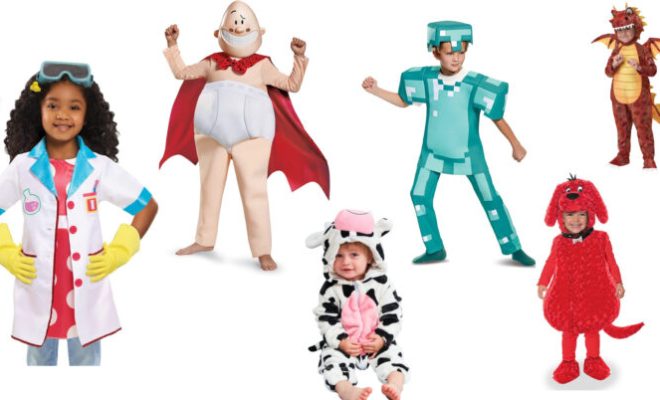
15 Amazing Book Character Costume Ideas For Teachers

15 Ways to Scaffold Learning
- Our Mission
Generating Effective Questions
Teachers ask an average of 400 questions a day, or 70,000 a year, according to The Guardian . While many of these questions are generated on the fly, asking effective questions by using questioning techniques (QTs) like those described below prompts deeper answers and engages students in a wide range of critical thinking tasks.
Open-Ended Questioning Techniques
The Nondestructive Testing Resource Center recommends that teachers use the following QTs to promote effective discussions. Use prompts like those at the top of the list with “more frequency than those at or near the bottom.”
- Seeking out evidence: “What makes you think that _____?”
- Explaining: “What are some of the causes that led to _____?”
- Relating concepts, ideas, and opinions: “How does that compare to _____?”
- Predicting: “What will you do next?”
- Describing: “What did you observe happening?”
Student-Generated Questions on Assigned Reading
Some teaching approaches, like the Socratic seminar, ask students to prepare questions on the readings as part of their homework. I ask learners to bring in one authentic and deep question about the assigned texts as part of a sketchnote visual journal assignment . It delights me to see their visual representations and questions improve as the semester continues.
Kari Lynn Wilson, a Washington State high school teacher, directs two-person student teams to write a couple of questions and share the questions with two other students sitting nearby. Next, the newly formed four-person group votes on their favorite one, which is asked during the subsequent whole-class discussion.
Questions That Motivate: The TAPN Approach
Larry Ferlazzo has shared educator and behavioral therapist Jim Peterson’s description of how robust prompts motivate students to answer questions . Note how Peterson’s second prompt provides much more information to the learner:
- You’re going to read the next three pages. When you finish, you are going to answer the five questions that follow the reading.
- When I tell you to begin, you will have one minute and 45 seconds. You are going to read the next paragraph looking for the main point. As you read, you are going to highlight any words or phrases that support what you believe is the main point. When you are finished, be prepared to share with a partner or with the entire class. You may begin.
The second set of instructions is more motivating, explains Peterson, because it addresses a series of factors that he calls TAPN:
- Time: “You have one minute and 45 seconds.” (Takeaway: Racing the countdown clock energizes students.)
- Amount: “You are going to read the next paragraph looking for the main point.” (Takeaway: The workload should be challenging, but not overwhelming.)
- Public: “When you are finished, be prepared to share with a partner or with the entire class.” (Takeaway: Knowing their work will likely be made public raises the stakes and increases students’ level of concern.)
- Novelty: “As you read, you are going to highlight any words or phrases that support what you believe is the main point.” (Takeaway: Small variations in the academic routine arouse students’ interest.)
Ultimately, incorporating TAPN into your question protocols will increase the percentage of students who actively engage with your questions.
Socratic Seminars
For my money, the best way to socialize students into asking and discussing rich questions is through the Socratic seminar, a model for facilitating collaborative dialogue. In this short video, Tyler Hester of Teach for America introduces his ninth-grade students to the Socratic seminar protocol:
Resources for Socratic Seminars
- Basic description: Socratic Seminar (PDF, 333KB), which includes great sample questions
- Video: Mount Everest Academy GATE Socratic Seminar
- Rubrics: KIPP’s Intensified Socratic Seminar Assessment Guide (PDF, 132KB) and Seminar Discussion Rubric (PDF, 177KB), and Beacon Learning Center’s Socratic Seminar Rubric (PDF, 8KB)
Socializing students into asking good questions on their own is the very definition of effective teaching.
Other Resources for Classroom Questioning
- From Now On’s Questioning Toolkit
- Teacher2TeacherHelp.com’s Questioning Mini-Lessons and Practice Activities
- Tom Drummond’s “ Discoverable Questions ” (a third of the way down the page)
A Quiz for the Teacher
QTs have been the subject of hundreds of studies, many of which Kathleen Cotton summarizes (PDF). I’ve gathered some of her most insightful takeaways into this short quiz.
Question 1 Which is more effective for fostering learning? A) Oral questions posed during classroom recitation B) Written questions
Question 2 Posing questions before a reading should be done with students who are: A) Older/better readers B) Younger/struggling readers
Question 3 Increasing the use of higher-order questions to _____ percent improves student-to-student interactions, speculative thinking, length of student responses, and relevant questions posed by learners.
Question 4 Should wait time differ when asking lower- vs. higher-order questions?
Answer 1: A, oral questions Answer 2: A, because young/struggling readers often read only the parts of the text that help them answer the questions . Answer 3: 50 percent Answer 4: Yes. Wait time should be about three seconds for lower-order questions, and longer for higher-order questions.
Translate this page from English...
*Machine translated pages not guaranteed for accuracy. Click Here for our professional translations.
Elementary Educators (K-3)
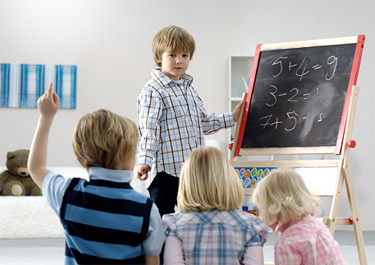
(complimentary)
- Tactical and Structural Recommendations
- Teaching Tactics that Encourage Active Learning
- Using Intellectual Standards to Assess Student Reasoning
- The Art of Redesigning Instruction
- Remodeled Lessons: K-3
- Introduction to Remodeling: Components of Remodels and Their Functions
- Glossary of Critical Thinking Terms
- The Role of Questions in Teaching, Thinking and Learning
- For Young Students (Elementary/K-6)
- Children's Guide Video Series (K-6)
- Math Resources Links
- Math in the Real World
- Differentiated Math Unlocked
- Math in the Real World Workshop
20 Math Critical Thinking Questions to Ask in Class Tomorrow
- November 20, 2023

The level of apathy towards math is only increasing as each year passes and it’s up to us as teachers to make math class more meaningful . This list of math critical thinking questions will give you a quick starting point for getting your students to think deeper about any concept or problem.
Since artificial intelligence has basically changed schooling as we once knew it, I’ve seen a lot of districts and teachers looking for ways to lean into AI rather than run from it.
The idea of memorizing formulas and regurgitating information for a test is becoming more obsolete. We can now teach our students how to use their resources to make educated decisions and solve more complex problems.
With that in mind, teachers have more opportunities to get their students thinking about the why rather than the how.
Table of Contents
Looking for more about critical thinking skills? Check out these blog posts:
- Why You Need to Be Teaching Writing in Math Class Today
- How to Teach Problem Solving for Mathematics
- Turn the Bloom’s Taxonomy Verbs into Engaging Math Activities

What skills do we actually want to teach our students?
As professionals, we talk a lot about transferable skills that can be valuable in multiple jobs, such as leadership, event planning, or effective communication. The same can be said for high school students.
It’s important to think about the skills that we want them to have before they are catapulted into the adult world.
Do you want them to be able to collaborate and communicate effectively with their peers? Maybe you would prefer that they can articulate their thoughts in a way that makes sense to someone who knows nothing about the topic.
Whatever you decide are the most essential skills your students should learn, make sure to add them into your lesson objectives.

When should I ask these math critical thinking questions?
Critical thinking doesn’t have to be complex or fill an entire lesson. There are simple ways that you can start adding these types of questions into your lessons daily!
Start small
Add specific math critical thinking questions to your warm up or exit ticket routine. This is a great way to start or end your class because your students will be able to quickly show you what they understand.
Asking deeper questions at the beginning of your class can end up leading to really great discussions and get your students talking about math.

Add critical thinking questions to word problems
Word problems and real-life applications are the perfect place to add in critical thinking questions. Real-world applications offer a more choose-your-own-adventure style assignment where your students can expand on their thought processes.
They also allow your students to get creative and think outside of the box. These problem-solving skills play a critical role in helping your students develop critical thinking abilities.

Keep reading for math critical thinking questions that can be applied to any subject or topic!
When you want your students to defend their answers.
- Explain the steps you took to solve this problem
- How do you know that your answer is correct?
- Draw a diagram to prove your solution.
- Is there a different way to solve this problem besides the one you used?
- How would you explain _______________ to a student in the grade below you?
- Why does this strategy work?
- Use evidence from the problem/data to defend your answer in complete sentences.
When you want your students to justify their opinions
- What do you think will happen when ______?
- Do you agree/disagree with _______?
- What are the similarities and differences between ________ and __________?
- What suggestions would you give to this student?
- What is the most efficient way to solve this problem?
- How did you decide on your first step for solving this problem?

When you want your students to think outside of the box
- How can ______________ be used in the real world?
- What might be a common error that a student could make when solving this problem?
- How is _____________ topic similar to _______________ (previous topic)?
- What examples can you think of that would not work with this problem solving method?
- What would happen if __________ changed?
- Create your own problem that would give a solution of ______________.
- What other math skills did you need to use to solve this problem?
Let’s Recap:
- Rather than running from AI, help your students use it as a tool to expand their thinking.
- Identify a few transferable skills that you want your students to learn and make a goal for how you can help them develop these skills.
- Add critical thinking questions to your daily warm ups or exit tickets.
- Ask your students to explain their thinking when solving a word problem.
- Get a free sample of my Algebra 1 critical thinking questions ↓

Share this:
7 thoughts on “20 math critical thinking questions to ask in class tomorrow”.
I would love to see your free math writing prompts, but there is no place for me to sign up. thank you
Ahh sorry about that! I just updated the button link!
Pingback: How to Teach Problem Solving for Mathematics -
Pingback: 5 Ways Teaching Collaboration Can Transform Your Math Classroom
Pingback: 3 Ways Math Rubrics Will Revitalize Your Summative Assessments
Pingback: How to Use Math Stations to Teach Problem Solving Skills
Pingback: How to Seamlessly Add Critical Thinking Questions to Any Math Assessment
Leave a Reply Cancel reply
- Grades 6-12
- School Leaders
Free end-of-year letter templates to your students 📝!
5 Critical Thinking Activities That Get Students Up and Moving
More movement means better learning.

It’s easy to resort to having kids be seated during most of the school day. But learning can (and should) be an active process. Incorporating movement into your instruction has incredible benefits—from deepening student understanding to improving concentration to enhancing performance. Check out these critical thinking activities, adapted from Critical Thinking in the Classroom , a book with over 100 practical tools and strategies for teaching critical thinking in K-12 classrooms.
Four Corners
In this activity, students move to a corner of the classroom based on their responses to a question with four answer choices. Once they’ve moved, they can break into smaller groups to explain their choices. Call on students to share to the entire group. If students are persuaded to a different answer, they can switch corners and further discuss.
Question ideas:
- Which president was most influential: George Washington, Thomas Jefferson, John Adams, or Abraham Lincoln?
- Is Holden Caulfield a hero: Strongly Agree, Agree, Disagree, or Strongly Disagree?
Gallery Walk
This strategy encourages students to move around the classroom in groups to respond to questions, documents, images, or situations posted on chart paper. Each group gets a different colored marker to record their responses and a set amount of time at each station. When groups move, they can add their own ideas and/or respond to what prior groups have written.
Gallery ideas:
- Political cartoons
Stations are a great way to chunk instruction and present information to the class without a “sit and get.” Group desks around the room or create centers, each with a different concept and task. There should be enough stations for three to five students to work for a set time before rotating.
Station ideas:
- Types of rocks
- Story elements
- Literary genres
Silent Sticky-Note Storm
In this brainstorming activity, students gather in groups of three to five. Each group has a piece of chart paper with a question at the top and a stack of sticky notes. Working in silence, students record as many ideas or answers as possible, one answer per sticky note. When time is up, they post the sticky notes on the paper and then silently categorize them.
- How can you exercise your First Amendment rights?
- What are all the ways you can divide a square into eighths?
Mingle, Pair, Share
Take your Think, Pair, Share to the next level. Instead of having students turn and talk, invite them to stand and interact. Play music while they’re moving around the classroom. When the music stops, each student finds a partner. Pose a question and invite students to silently think about their answer. Then, partners take turns sharing their thoughts.
- How do organisms modify their environments?
- What is the theme of Romeo and Juliet ?
Looking for more critical thinking activities and ideas?
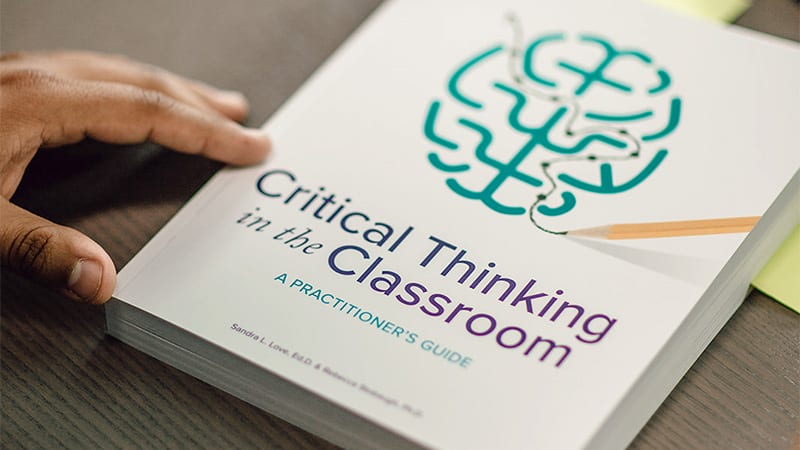
Critical Thinking in the Classroom is a practitioner’s guide that shares the why and the how for building critical thinking skills in K-12 classrooms. It includes over 100 practical tools and strategies that you can try in your classroom tomorrow!
Get Your Copy of Critical Thinking in the Classroom
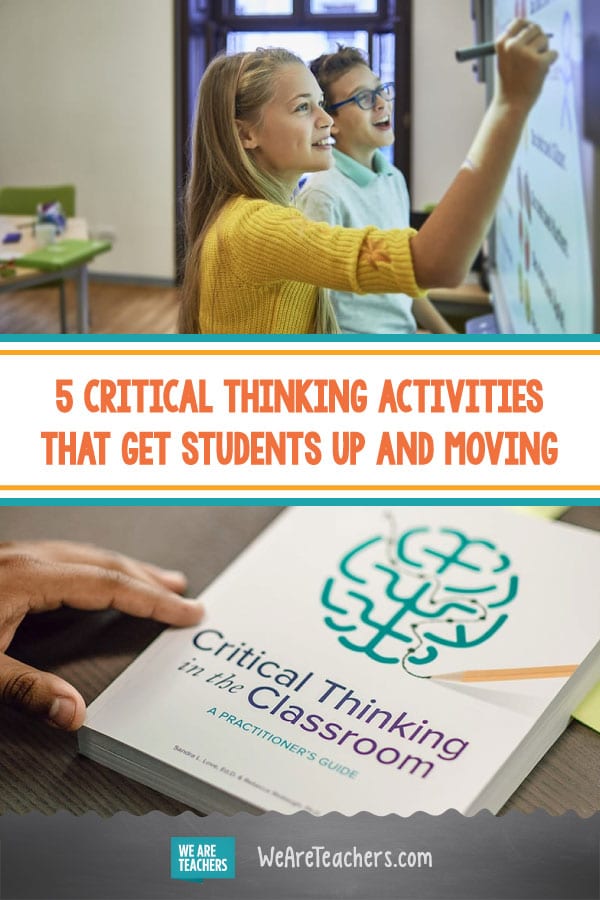
You Might Also Like
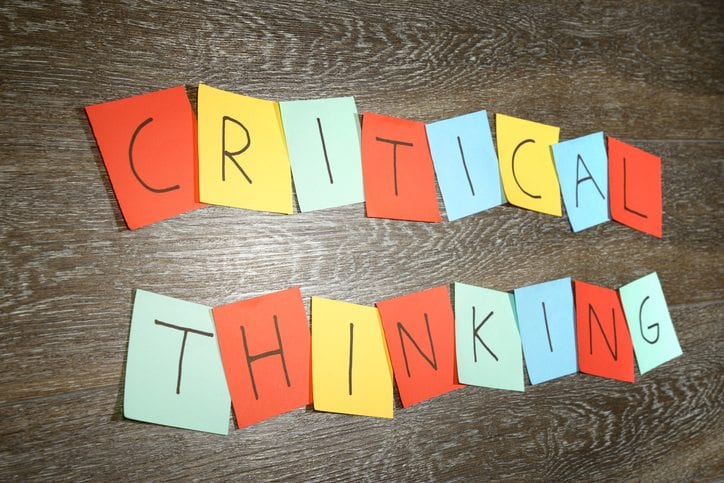
10 Tips for Teaching Kids To Be Awesome Critical Thinkers
Help students dig deeper! Continue Reading
Copyright © 2024. All rights reserved. 5335 Gate Parkway, Jacksonville, FL 32256
- Augsburg.edu
- Inside Augsburg
Search Strommen Center for Meaningful Work
- Faculty & Staff
- Graduate Students
- First Generation
- International
- Students With Disabilities
- Undocumented
- Business & Finance
- Culture and Language
- Environmental Sustainability
- Government, Law & Policy
- Health Professions
- Human & Social Services
- Information Technology & Data
- Marketing, Media & Communications
- Resumes and Cover Letters
- Expand Your Network / Mentor
- Explore Your Interests / Self Assessment
- Negotiate an Offer
- Prepare for an Interview
- Prepare for Graduate School
- Search for a Job / Internship
- Job Fair Preparation
- Start Your Internship
- Choosing a Major
- Career Collaborative
- Travelers EDGE
- Meet the Team
Critical Thinking: A Simple Guide and Why It’s Important
- Share This: Share Critical Thinking: A Simple Guide and Why It’s Important on Facebook Share Critical Thinking: A Simple Guide and Why It’s Important on LinkedIn Share Critical Thinking: A Simple Guide and Why It’s Important on X
Critical Thinking: A Simple Guide and Why It’s Important was originally published on Ivy Exec .
Strong critical thinking skills are crucial for career success, regardless of educational background. It embodies the ability to engage in astute and effective decision-making, lending invaluable dimensions to professional growth.
At its essence, critical thinking is the ability to analyze, evaluate, and synthesize information in a logical and reasoned manner. It’s not merely about accumulating knowledge but harnessing it effectively to make informed decisions and solve complex problems. In the dynamic landscape of modern careers, honing this skill is paramount.
The Impact of Critical Thinking on Your Career
☑ problem-solving mastery.
Visualize critical thinking as the Sherlock Holmes of your career journey. It facilitates swift problem resolution akin to a detective unraveling a mystery. By methodically analyzing situations and deconstructing complexities, critical thinkers emerge as adept problem solvers, rendering them invaluable assets in the workplace.
☑ Refined Decision-Making
Navigating dilemmas in your career path resembles traversing uncertain terrain. Critical thinking acts as a dependable GPS, steering you toward informed decisions. It involves weighing options, evaluating potential outcomes, and confidently choosing the most favorable path forward.
☑ Enhanced Teamwork Dynamics
Within collaborative settings, critical thinkers stand out as proactive contributors. They engage in scrutinizing ideas, proposing enhancements, and fostering meaningful contributions. Consequently, the team evolves into a dynamic hub of ideas, with the critical thinker recognized as the architect behind its success.
☑ Communication Prowess
Effective communication is the cornerstone of professional interactions. Critical thinking enriches communication skills, enabling the clear and logical articulation of ideas. Whether in emails, presentations, or casual conversations, individuals adept in critical thinking exude clarity, earning appreciation for their ability to convey thoughts seamlessly.
☑ Adaptability and Resilience
Perceptive individuals adept in critical thinking display resilience in the face of unforeseen challenges. Instead of succumbing to panic, they assess situations, recalibrate their approaches, and persist in moving forward despite adversity.
☑ Fostering Innovation
Innovation is the lifeblood of progressive organizations, and critical thinking serves as its catalyst. Proficient critical thinkers possess the ability to identify overlooked opportunities, propose inventive solutions, and streamline processes, thereby positioning their organizations at the forefront of innovation.
☑ Confidence Amplification
Critical thinkers exude confidence derived from honing their analytical skills. This self-assurance radiates during job interviews, presentations, and daily interactions, catching the attention of superiors and propelling career advancement.
So, how can one cultivate and harness this invaluable skill?
✅ developing curiosity and inquisitiveness:.
Embrace a curious mindset by questioning the status quo and exploring topics beyond your immediate scope. Cultivate an inquisitive approach to everyday situations. Encourage a habit of asking “why” and “how” to deepen understanding. Curiosity fuels the desire to seek information and alternative perspectives.
✅ Practice Reflection and Self-Awareness:
Engage in reflective thinking by assessing your thoughts, actions, and decisions. Regularly introspect to understand your biases, assumptions, and cognitive processes. Cultivate self-awareness to recognize personal prejudices or cognitive biases that might influence your thinking. This allows for a more objective analysis of situations.
✅ Strengthening Analytical Skills:
Practice breaking down complex problems into manageable components. Analyze each part systematically to understand the whole picture. Develop skills in data analysis, statistics, and logical reasoning. This includes understanding correlation versus causation, interpreting graphs, and evaluating statistical significance.
✅ Engaging in Active Listening and Observation:
Actively listen to diverse viewpoints without immediately forming judgments. Allow others to express their ideas fully before responding. Observe situations attentively, noticing details that others might overlook. This habit enhances your ability to analyze problems more comprehensively.
✅ Encouraging Intellectual Humility and Open-Mindedness:
Foster intellectual humility by acknowledging that you don’t know everything. Be open to learning from others, regardless of their position or expertise. Cultivate open-mindedness by actively seeking out perspectives different from your own. Engage in discussions with people holding diverse opinions to broaden your understanding.
✅ Practicing Problem-Solving and Decision-Making:
Engage in regular problem-solving exercises that challenge you to think creatively and analytically. This can include puzzles, riddles, or real-world scenarios. When making decisions, consciously evaluate available information, consider various alternatives, and anticipate potential outcomes before reaching a conclusion.
✅ Continuous Learning and Exposure to Varied Content:
Read extensively across diverse subjects and formats, exposing yourself to different viewpoints, cultures, and ways of thinking. Engage in courses, workshops, or seminars that stimulate critical thinking skills. Seek out opportunities for learning that challenge your existing beliefs.
✅ Engage in Constructive Disagreement and Debate:
Encourage healthy debates and discussions where differing opinions are respectfully debated.
This practice fosters the ability to defend your viewpoints logically while also being open to changing your perspective based on valid arguments. Embrace disagreement as an opportunity to learn rather than a conflict to win. Engaging in constructive debate sharpens your ability to evaluate and counter-arguments effectively.
✅ Utilize Problem-Based Learning and Real-World Applications:
Engage in problem-based learning activities that simulate real-world challenges. Work on projects or scenarios that require critical thinking skills to develop practical problem-solving approaches. Apply critical thinking in real-life situations whenever possible.
This could involve analyzing news articles, evaluating product reviews, or dissecting marketing strategies to understand their underlying rationale.
In conclusion, critical thinking is the linchpin of a successful career journey. It empowers individuals to navigate complexities, make informed decisions, and innovate in their respective domains. Embracing and honing this skill isn’t just an advantage; it’s a necessity in a world where adaptability and sound judgment reign supreme.
So, as you traverse your career path, remember that the ability to think critically is not just an asset but the differentiator that propels you toward excellence.

IMAGES
VIDEO
COMMENTS
Upper Elementary. Students in upper elementary grades can be reluctant to put themselves out there, especially with answers that seem weird. In some cases, such hesitancy is actually fear of differing from their peers (and a barrier to critical thinking).. But that's exactly why it's important to practice answering ambiguous questions.
100+ Critical Thinking Questions for Students To Ask About Anything. Critical thinkers question everything. By We Are Teachers Staff. Sep 14, 2022. ... Combined, the We Are Teachers editorial team has over 75 years of teaching experience across elementary, middle, and high school. We also work with a network of over 500 teacher writers and ...
Questions For Students: Elementary Through Middle School. For this age of kids, use any of the examples above and try these more abstract critical thinking questions too. ... Creative Kids Critical Thinking Questions For Students. Jennifer Kropf. Jennifer is the founder and chief editor of Healthy Happy Impactful®. She believes that living ...
Debates. This is one of those classic critical thinking activities that really prepares kids for the real world. Assign a topic (or let them choose one). Then give kids time to do some research to find good sources that support their point of view. Finally, let the debate begin!
"An interesting question and the discussion that follows can open up paths of critical thinking for students at any age," Orr says. "With a few thoughtful prompts and a lot of noticing and modeling, we as educators can help young students engage in these types of academic conversations in ways that deepen their learning and develop their ...
Maskot Images / Shutterstock. Critical thinking is using analysis and evaluation to make a judgment. Analysis, evaluation, and judgment are not discrete skills; rather, they emerge from the accumulation of knowledge. The accumulation of knowledge does not mean students sit at desks mindlessly reciting memorized information, like in 19th century ...
The questions are unrestricted and open the mind up to unfettered thought, perfect for innovation and understanding. The sections begin with Mathematical Questions because for the purpose of this list they're the most general and therefore the most useful. See also our 28 Critical Thinking Question Stems For Classroom Use. Logical Questions
1. How would you feel if you cannot go out to play? 2. If you could visit a cartoon character, which one would it be? 3. Who do you want to pick you up from school - mom or dad, and why? 4. If you get a day off from school, who would you like to visit and what would you do there? 5.
Critical Thinking Questions for Ages 7 to 10. Older elementary students ages 7 to 10 start to develop true critical thinking skills. They are able to see someone else's point of view, make logical inferences, and separate fact from fiction. At this age you can start to use more open-ended questions about things relevant to a child's life or ...
4. 5. TED-Ed lessons on the subject Critical Thinking. TED-Ed celebrates the ideas of teachers and students around the world. Discover hundreds of animated lessons, create customized lessons, and share your big ideas.
Thinking critically involves applying reason and logic to assess arguments and come to your own conclusions. Instead of reciting facts or giving a textbook answer, critical thinking skills encourage students to move beyond knowing information and get to the heart of what they really think and believe. 15 Questions to Encourage Critical Thinking ...
Here are 101 questions for kids that will get them "thinking and talking" - helping you get to know your child with more meaningful conversations, and at the same time building the skills they need to thrive in tomorrow's world (e.g. critical thinking, communication, creativity etc).
Questions to Provoke Critical Thinking. Varying question stems can sustain engagement and promote critical thinking. The timing, sequence and clarity of questions you ask students can be as important as the type of question you ask. The table below is organized to help formulate questions provoking gradually higher levels of thinking. What do ...
Question Stems Framed Around Bloom's Taxonomy. by TeachThought Staff. While critical thinking is a foundation rather than a brick, how you build that foundation depends on the learning process itself: exposing students to new thinking and promoting interaction with that thinking in a gradual release of responsibility approach.
Students will have to evaluate each option and make an informed decision about which is best. 6. Brainstorming. Brainstorming different ideas, answers, and solutions can also help develop critical thinking skills. Students will need to come up with different approaches and ideas and think outside the box. 7.
10. Hold a Q&A session. One way you can figure out how well kids are grasping critical-thinking skills is by holding question-and-answer sessions. Ask a variety of questions one-on-one or in small groups and take note of the levels of thought individual students use regularly and avoid over time.
Spread the loveIntroduction: Critical thinking is an essential skill for students to develop, as it enables them to analyze information, evaluate arguments, and make informed decisions. To enhance critical thinking abilities, students can engage with thought-provoking questions that challenge assumptions and encourage deeper reflection. In this article, we present sixteen critical thinking ...
Inspire creativity. Imagination is key to teaching critical thinking in elementary school. Teachers should seek out new ways for students to use information to create something new. Art projects are an excellent way to do this. Students can also construct inventions, write a story or poem, create a game, sing a song—the sky's the limit.
Teachers ask an average of 400 questions a day, or 70,000 a year, according to The Guardian.While many of these questions are generated on the fly, asking effective questions by using questioning techniques (QTs) like those described below prompts deeper answers and engages students in a wide range of critical thinking tasks.
180 Unique Question of the Day Ideas To Promote Critical Thinking. For discussions, journaling, and community building. Students get better at answering questions by, well, answering questions. Asking a question of the day, where each student has an opportunity to think about it and respond, builds a knowledge of how questions work.
Foundation for Critical Thinking. PO Box 31080 • Santa Barbara, CA 93130 . Toll Free 800.833.3645 • Fax 707.878.9111. [email protected]
Start small. Add critical thinking questions to word problems. Keep reading for math critical thinking questions that can be applied to any subject or topic! When you want your students to defend their answers. When you want your students to justify their opinions. When you want your students to think outside of the box.
Check out these critical thinking activities, adapted from Critical Thinking in the Classroom , a book with over 100 practical tools and strategies for teaching critical thinking in K-12 classrooms. Four Corners. In this activity, students move to a corner of the classroom based on their responses to a question with four answer choices.
Critical thinking enriches communication skills, enabling the clear and logical articulation of ideas. Whether in emails, presentations, or casual conversations, individuals adept in critical thinking exude clarity, earning appreciation for their ability to convey thoughts seamlessly. ... 2024 National Student Data Corps Data Science Symposium ...